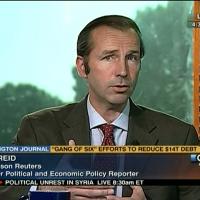News
To understand Trump's America better, Reuters appoints special correspondent
Wednesday 10 May 2017

Reuters has appointed a special correspondent to cover the American Midwest and Southeast - part of President Donald Trump's rural and conservative heartland - with a focus on economic change and government policy.
Tim Reid (photo), a national affairs reporter based in Los Angeles, will be Reuters' first US political correspondent in the region.
“Tim will work with reporters and editors in Washington and beyond on political, social and business stories of international resonance,” Americas editor Kevin Krolicki wrote in a note to staff. “Those include questions of how and whether President Trump can live up to his promises of bringing back jobs in the region’s hard-hit industries, how changes to national health care policy play out on the ground and what tighter immigration controls mean for businesses and workers.”
"We looked at this pretty closely, and we thought it was a politically and culturally important area of America that really deserved more intensive coverage," said national editor Jason Szep. "We wanted to get beyond the typical approach of parachuting a correspondent into the region for a few days or a week and start to really understand it,” he told the Poynter Institute, a journalism training organisation based in Florida.
Reid, who joined Reuters in 2010 from The Times where he was Washington correspondent, will move from city to city, spending months-long stretches in each place to immerse himself in the community.
"It gives us an opportunity to get up close and start to really see how this region ticks," Szep said.
This is a novel approach for Reuters, designed to give its coverage of America lived-in authenticity, Poynter said.
"I think we have to understand all voters better," Szep said. "It is very important that we understand the nuances behind the voting. More broadly, the media collectively didn't acquit itself very well, really digging under the surface of this part of the country. We were, in some ways, left with caricatures of angry voters, older white men, without really reporting about the nuance of that anger."
Poynter said Szep acknowledged that a single correspondent isn't going to erase the disconnect between journalists and rural voters. But it will give Reuters an opportunity to examine whether people in places like Ohio, West Virginia and Michigan - states that Trump carried - will respond to the results of his promise to deliver jobs to their regions.
Reuters plans to do that with polling, Szep said, along with some other ideas on new story formats. ■
- Source
- Poynter
- « Previous
- Next »
- 724 of 2177